Paying an ode to the sweet flavour of winter, Jnanendra Das encapsulates the syrupy, saccharine goodness of nolen gur. 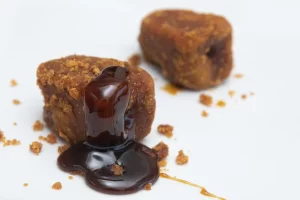
Waking up on a crisp winter morning to the nutty, sweet aroma in the air signals the arrival of Makar Sankranti, the winter harvest festival. Though known by various names across India—Magh Bihu in Assam, Pongal in Tamil Nadu, Lohri in Punjab, and Uttarayan in Gujarat—the celebration is unified by its harvest-inspired delicacies. This day also marks the Sun’s transition into the Northern Hemisphere, bringing longer days and shorter nights. 
During this season, people in parts of Bengal, Assam and beyond eagerly prepare traditional sweets known as pithe– a variety of traditional sweets like pancakes, dumplings, and fritters, along with laddus made from gur (jaggery). This time of year also marks the arrival of nolen gur, Bengal’s much-loved liquid gold.
In his poem Bhalo Re Bhalo, Sukumar Ray, the icon of modern Indian children’s literature and father of legendary filmmaker Satyajit Ray, poetically captures life’s greatest joys. He writes that while there are many good things in life, such as the smell of flowers, the rhythm of the poem, rain in summer, and korma, nothing can be better than bread with jhola gur. Jhola gur, also known as nolen gur, is made by cooking the sap extracted from a date palm tree when it reduces to a molass-like consistency.
The laborious art of making nolen gur even found cinematic expression in the 1973 film Saudagar, directed by Sudhendu Roy and starring Nutan, Amitabh Bachchan, and Padma Khanna. The film beautifully depicts the painstaking transformation of sap into jaggery, a tradition rich in resilience.
West Bengal, especially Nadia and Birbhum districts, is the heart of date jaggery markets. This makes it difficult to find unadulterated and authentic jaggery in this part of the country. Biswa Bangla, a West Bengal state-run enterprise, safeguards authenticity by sourcing directly from artisans and farms. They also deal with date jaggery products from “Earth Story Farms.”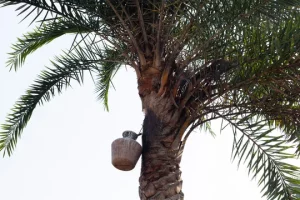
For nolen gur, the journey from tree to table involves intricate, labour-intensive processes passed down through generations. Earth Story Farms (ESF), founded in 2020 by Senjuti Mahato and Abhishek Chhoudhury, is dedicated to preserving this tradition. Their mission promotes clean eating, seasonality, and indigenous ingredients. “Nolen gur is more than a sweetener; it’s an experience deeply intertwined with Bengal’s land, culture, and seasons,” says Mahato.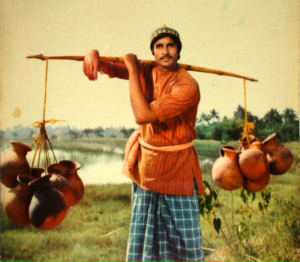
The making
The age-old practice of tapping date palms begins in November as temperatures drop and continues until February. During the winter months, as the sun sets, local harvesters, known as shiulis, climb the tall trunks of mature trees to carefully make incisions in the bark, allowing khejur rosh (sap) to drip into earthen pots. These cuts must be precise—too shallow, and the sap won’t flow; too deep, and the tree could be harmed.
By dawn, the pots tied to the tree top are filled with sweet nectar, ready for processing. They are collected before sunrise to prevent from triggering fermentation by the heat, which would spoil the sap. The sap is then slowly simmered in large flat-bottomed pans over a wood fire.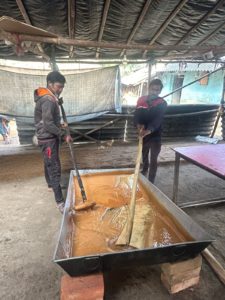
“The art of making nolen gur cannot be mechanised. It requires human touch and patience,” adds Senjuti. This process is a delicate alchemy, where the sap slowly caramelises and first becomes Nolen Gur—a soft, syrupy sweetener with a distinct, almost ethereal flavour, offering a deep, warm sweetness unique to Bengal.
As the syrup cooks further, it thickens into Patali, the final stage of this age-old craft. Patali Gur is a dense, granular jaggery, hand-poured into moulds and left to cool, forming solid golden blocks. Its texture is smooth with a slight graininess, and its taste perfectly balances sweetness with a subtle smokiness from the wood fire. ESF uses specific woods, like sonajhuri, eucalyptus and husk, to maintain that.
At Earth Story Farms, this heritage craft is adapted for a wider audience without adulteration or losing its authenticity. Sustainable packaging and careful logistics ensure the gur reaches kitchens across India and beyond, still rich in flavour.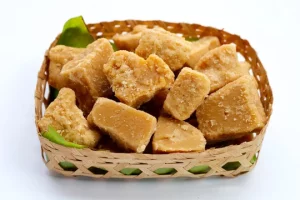
Preserving the heritage
There is growing concern that nolen gur may gradually fade into obscurity. The introduction of processed sugar into traditional jaggery and the rise of cheaper substitutes threaten its authenticity. Additionally, while seasonality adds to its charm, it also brings vulnerability—winters are becoming shorter and warmer each year, impacting production.
Mahato recognises the danger climate change poses to this craft. Rising temperatures affect the quality of sap from date palm trees, and younger generations are hesitant to take up the demanding, seasonal work involved in making nolen gur. Yet, she remains hopeful.
“The renewed interest in artisanal, sustainable foods gives us hope. By supporting local artisans and ensuring fair wages, we’re not just selling a product—we’re preserving a legacy,” says Mahato. Through fostering a community of dedicated artisans who share this mission, Earth Story Farms continues to honour and sustain this traditional craft year after year.
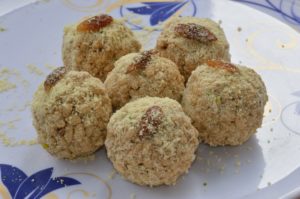
Nolen Gur’s flavour profile is complex, blending earthy caramel richness with hints of bitterness and smokiness, making it an essential ingredient in both sweet and savoury dishes. It holds emotional resonance, symbolising nostalgia and togetherness during festivals and family gatherings. With minimal processing and a profound respect for nature, the artisanal production of Nolen Gur is a celebration of sustainability and craftsmanship, ensuring that this iconic Bengali sweet remains a cherished part of the region’s heritage for generations to come.
From ice cream and roshogolla to sweets like apong, a Khasi fermented rice cake which can be savoured with liquid date jaggery, jol bhora (centre-filled with gur), sandesh and many others, there is nothing nolen gur can’t make better. GI tag granted Joynagar’s moa is also prepared with date jaggery. As the spirit of Bihu and Makar Sankranti gets carried off throughout January, nolen gur pairs beautifully with rice pudding or doi chira, the quintessential Assamese breakfast, or can be eaten raw like toffee for a nostalgic reminisce of childhood.
With time, nolen gur has also diversified into contemporary desserts and drinks. Talking about this shift, Mahato says, “As a founder, I see this modernisation as a natural and exciting evolution. Its rich history and distinct flavour have long been staples in Bengali cuisine. Still, its versatility now shines in contemporary kitchens—from elegant desserts and savoury dishes to innovative sauces and cocktails. What excites me most is its journey from Bengal’s humble villages to high-end kitchens, reflecting the dedication of local artisans. With its health benefits and natural, unrefined quality, nolen gur is perfect for today’s mindful eaters, and it’s time younger generations embrace its true greatness.”
According to the co-founder, the northeastern states contribute 2–3% of ESF’s revenue on their online store, with jaggery, desi cow ghee, and multifloral honey ranking among their top-selling products in the region.
If one visits rural Bengal during winter, especially places like Shantiniketan in Bolpur, Majhdia in Kishanganj or Jaynagar-Mazilpur in South 24 Parganas, don’t forget to try liquid nolen gur early in the morning when it’s freshly prepared.



